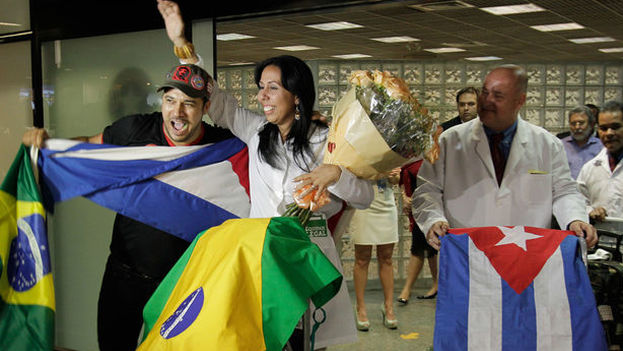
![]() 14ymedio, Madrid, 5 January 2023 — Brazil wants to resume the Mais Medicos [More Doctors] program as soon as possible, but collaboration with Cuba, at least as a priority, is up in the air. The Secretary of Primary Care of the Ministry of Health, Nésio Fernandes, said in an interview published this Wednesday by Folha de Sao Paulo that Brazilian professionals will have priority.
14ymedio, Madrid, 5 January 2023 — Brazil wants to resume the Mais Medicos [More Doctors] program as soon as possible, but collaboration with Cuba, at least as a priority, is up in the air. The Secretary of Primary Care of the Ministry of Health, Nésio Fernandes, said in an interview published this Wednesday by Folha de Sao Paulo that Brazilian professionals will have priority.
“The agenda to resume Mais Médicos is immediate. We want to place doctors in all Brazilian municipalities in a short period of time,” he explained. In the absence of more details, the program, on this occasion, will consist of trying to cover the demand with health workers registered in the regional councils. If they are unable to do this, they would turn to Brazilians trained abroad and foreigners.
What is not planned, he said, is to “repeat the collaboration with Cuba in the previous way, but to do it with the participation of the Pan American Health Organization (PAHO, the Latin American arm of the World Health Organization).”
The Mais Medicos program was launched in 2013 by then-President Dilma Rousseff with the aim of attracting professionals to rural areas, where people suffered from a lack of medical assistance. The positions had to be filled with local and foreign personnel, for which workers from different countries registered as volunteers.
However, the Cubans were sent in a “package” within a collaboration scheme with PAHO and ended up being by far the largest group. In its five years of operation, more than 20,000 professionals from the Island treated 113.3 million Brazilian patients, according to official data.
In 2018, and already before assuming the presidency, Jair Bolsonaro presented on numerous occasions his intention to cancel the agreements with Cuba, which he considered a way to inject money into the Island regime in exchange for doctors who, at times, lacked professionalism. The then-president proposed to make direct and individualized contracts.
Faced with the imminent rupture, Cuba went ahead and announced that it was leaving the mission. At that time there were more than 8,000 Cuban doctors in the country, out of the total of 18,240 places. Of these, 2,500 decided to “desert” and stay in Brazil, and some even aspired to the new positions.
To take advantage of this offer, Brazil decreed a provisional measure, consolidated as a law, by which Cubans were incorporated into Bolsonaro’s program if they passed an exam known as revalidation. After passing it, they could apply for a license to work throughout the national territory.
The agreement with Cuba in Rousseff’s time, according to the Brazilian press, divided the remuneration, which at that time was 12,000 reais (about 2,200 dollars), into three parts: 70% went to the Cuban State, 5% to PAHO and the remaining 25% to the medical workers.
President Bolsonaro introduced a plan known as Medicos pelo Brasil [Doctors for Brazil] that, according to Nésio Fernandes, “has failed” and maintains inland municipalities and peripheral areas without assistance.
In November, the senator of the Workers’ Party (then in the opposition and now in power with Lula da Silva), Humberto Costa, told the Brazilian press that the new Mais Medicos will change with respect to its previous format. “We want a project, a program that has the principles of Mais Medicos, to ensure that these gaps in medical care can be filled. Now, our design is still going to be built, because today there are a significant number of doctors,” he said.
“There are doctors who graduated abroad and have not yet been revalidated; there are Cuban doctors who stayed in Brazil, and there are doctors who graduated and are not being absorbed by the labor market. Then, a similar program could be implemented, but with a predominance of Brazilians,” he added.
The official Cuban press has received the news with joy, although it has avoided including in the note the express mention that an agreement like the previous one is not foreseen. Perhaps because Havana wants to maintain discretion for the moment about a future lucrative agreement with the Cuban Medical Services Marketer.
Translated by Regina Anavy
____________
COLLABORATE WITH OUR WORK: The 14ymedio team is committed to practicing serious journalism that reflects Cuba’s reality in all its depth. Thank you for joining us on this long journey. We invite you to continue supporting us by becoming a member of 14ymedio now. Together we can continue transforming journalism in Cuba.
